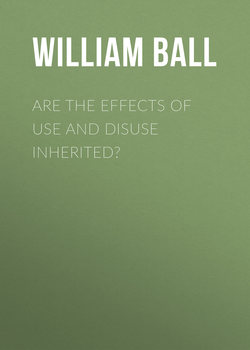Are the Effects of Use and Disuse Inherited?

Реклама. ООО «ЛитРес», ИНН: 7719571260.
Оглавление
Ball William Platt. Are the Effects of Use and Disuse Inherited?
PREFACE
IMPORTANCE AND BEARING OF THE INQUIRY
SPENCER'S EXAMPLES AND ARGUMENTS
DIMINUTION OF THE JAWS IN CIVILIZED RACES
DIMINISHED BITING MUSCLES OF LAP-DOGS
CROWDED TEETH
BLIND CAVE-CRABS
NO CONCOMITANT VARIATION FROM CONCOMITANT DISUSE
THE GIRAFFE, AND NECESSITY FOR CONCOMITANT VARIATION
ALLEGED RUINOUS EFFECTS OF NATURAL SELECTION
ADVERSE CASE OF NEUTER INSECTS
ÆSTHETIC FACULTIES
LACK OF EVIDENCE
INHERITED EPILEPSY IN GUINEA-PIGS
INHERITED INSANITY AND NERVOUS DISORDERS
INDIVIDUAL AND TRANSMISSIBLE TYPE NOT MODIFIED ALIKE BY THE DIRECT EFFECT OF CHANGED HABITS OR CONDITIONS
DARWIN'S EXAMPLES
REDUCED WINGS OF BIRDS OF OCEANIC ISLANDS
DROOPING EARS AND DETERIORATED INSTINCTS
WINGS AND LEGS OF DUCKS AND FOWLS
PIGEONS' WINGS
SHORTENED BREAST-BONE IN PIGEONS
SHORTENED FEET IN PIGEONS
SHORTENED LEGS OF RABBITS
BLIND CAVE-ANIMALS
INHERITED HABITS
TAMENESS OF RABBITS
MODIFICATIONS OBVIOUSLY ATTRIBUTABLE TO SELECTION
SIMILAR EFFECTS OF NATURAL SELECTION AND USE-INHERITANCE
INFERIORITY OF SENSES IN EUROPEANS
SHORT-SIGHT IN WATCHMAKERS AND ENGRAVERS
LARGER HANDS OF LABOURERS' INFANTS.49
THICKENED SOLE IN INFANTS
A SOURCE OF MENTAL CONFUSION
WEAKNESS OF USE-INHERITANCE
INHERITED INJURIES
INHERITED MUTILATIONS
THE MOTMOT'S TAIL
OTHER INHERITED INJURIES MENTIONED BY DARWIN
QUASI-INHERITANCE
MISCELLANEOUS CONSIDERATIONS
TRUE RELATION OF PARENTS AND OFFSPRING
INVERSE INHERITANCE
EARLY ORIGIN OF THE OVA
MARKED EFFECTS OF USE AND DISUSE ON THE INDIVIDUAL
WOULD NATURAL SELECTION FAVOUR USE-INHERITANCE?
USE-INHERITANCE AN EVIL
VARIED EFFECTS OF USE AND DISUSE
USE-INHERITANCE IMPLIES PANGENESIS
PANGENESIS IMPROBABLE
SPENCER'S EXPLANATION OF USE-INHERITANCE
CONCLUSIONS
USE-INHERITANCE DISCREDITED AS UNNECESSARY, UNPROVEN, AND IMPROBABLE
MODERN RELIANCE ON USE-INHERITANCE MISPLACED
Отрывок из книги
The question whether the effects of use and disuse are inherited, or, in other words, whether acquired characters are hereditary, is of considerable interest to the general student of evolution; but it is, or should be, a matter of far deeper interest to the thoughtful philanthropist who desires to ensure the permanent welfare and happiness of the human race. So profoundly important, in fact, are the moral, social, and political conclusions that depend on the answer to this inquiry, that, as Mr. Herbert Spencer rightly says, it "demands, beyond all other questions whatsoever, the attention of scientific men."
It is obvious that we can produce important changes in the individual. We can, for example, improve his muscles by athletics, and his brain by education. The use of organs enlarges and strengthens them; the disuse of parts or faculties weakens them. And so great is the power of habit that it is proverbially spoken of as "second nature." It is thus certain that we can modify the individual. We can strengthen (or weaken) his body; we can improve (or deteriorate) his intellect, his habits, his morals. But there remains the still more important question which we are about to consider. Will such modifications be inherited by the offspring of the modified individual? Does individual improvement transmit itself to descendants independently of personal teaching and example? Have artificially produced changes of structure or habit any inherent tendency to become congenitally transmissible and to be converted in time into fixed traits of constitution or character? Can the philanthropist rely on such a tendency as a hopeful factor in the evolution of mankind? – the only sound and stable basis of a higher and happier state of things being, as he knows or ought to know, the innate and constitutionally-fixed improvement of the race as a whole. If acquired modifications are impressed on the offspring and on the race, the systematic moral training of individuals will in time produce a constitutionally moral race, and we may hope to improve mankind even in defiance of the unnatural selection by which a spurious but highly popular philanthropy would systematically favour the survival of the unfittest and the rapid multiplication of the worst. But if acquired modifications do not tend to be transmitted, if the use or disuse of organs or faculties does not similarly affect posterity by inheritance, then it is evident that no innate improvement in the race can take place without the aid of natural or artificial selection.
.....
The extract concerning a somewhat similar "class of difficulties," which Mr. Spencer quotes from his Principles of Biology, is faulty in its reasoning,9 though legitimate in its conclusion concerning the increasing difficulty of evolution in proportion with the increasing number and complexity of faculties to be evolved. But this increasing difficulty of complex evolution is only overcome by some favourably-varying individuals and species – not by all. And as the difficulty increases we find neglect and decay of the less-needed faculties – as with domesticated animals and civilized men, who lose in one direction while they gain in another. The increasing difficulty of complex evolution by natural selection is no proof whatever of use-inheritance10 except to those who confound difficulty with impossibility.
Mr. Spencer further contends that natural selection, by unduly developing specially advantageous modifications without the necessary but complex secondary modifications, would render the constitution of a variety "unworkable" (p. 23). But this seems hardly feasible, seeing that natural selection must continually favour the most workable constitutions, and will only preserve organisms in proportion as they combine general workableness with the special modification. On the other hand, according to Mr. Spencer himself, use-inheritance must often disturb the balance of the constitution. Thus it tends to make the jaws and teeth unworkable through the overcrowding and decay of the teeth – there being, as his illustrations show, no simultaneous or concomitant or proportional variation in relation to altered degree of use or disuse.
.....